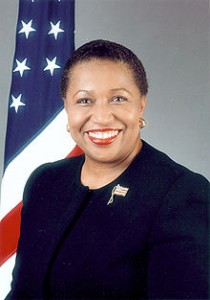CAROL MOSELEY (b. Aug. 16, 1947, Chicago, Ill., U.S.), U.S. senator from Illinois who, in 1992, became the first African-American woman elected to the U.S. Senate. Moseley-Braun attended the University of Illinois at Chicago and received a law degree from the University of Chicago.
She worked as an assistant U.S. attorney before her election to the Illinois House of Representatives in 1978. During her 10 years there she became known for her advocacy of health-care and education reform and gun control. She was named assistant leader for the Democratic majority.
In 1988-92 Moseley-Braun served as Cook county recorder of deeds. Displeased with U.S. Senator Alan Dixon’s support of U.S. Supreme Court nominee Clarence Thomas, she ran against Dixon in the 1992 Democratic primary. Though poorly financed, she won an upset victory over Dixon on her way to capturing a seat in the Senate.
Shortly after becoming senator, Moseley-Braun won clashes with Southern senators over a patent for a Confederate insignia. She was noted for her support of individual retirement accounts for homemakers and for filibustering to restore budget monies for youth job training and for senior citizens. On the other hand, she was criticized for easing legal restrictions on the sale of two television broadcasting companies, lavish personal spending of campaign money, and favouring legislation to benefit a corporate campaign donor. A matter of considerable controversy centred on Moseley-Braun’s associations with Nigerian military dictators Ibrahim Babangida and Sani Abacha
